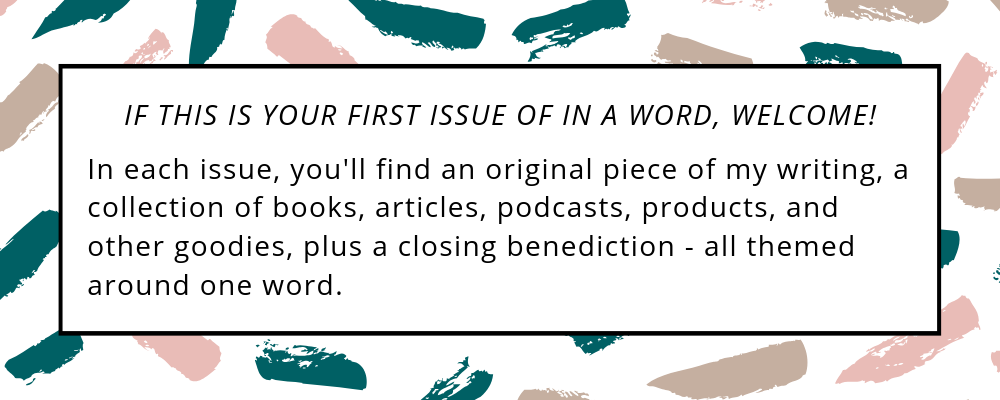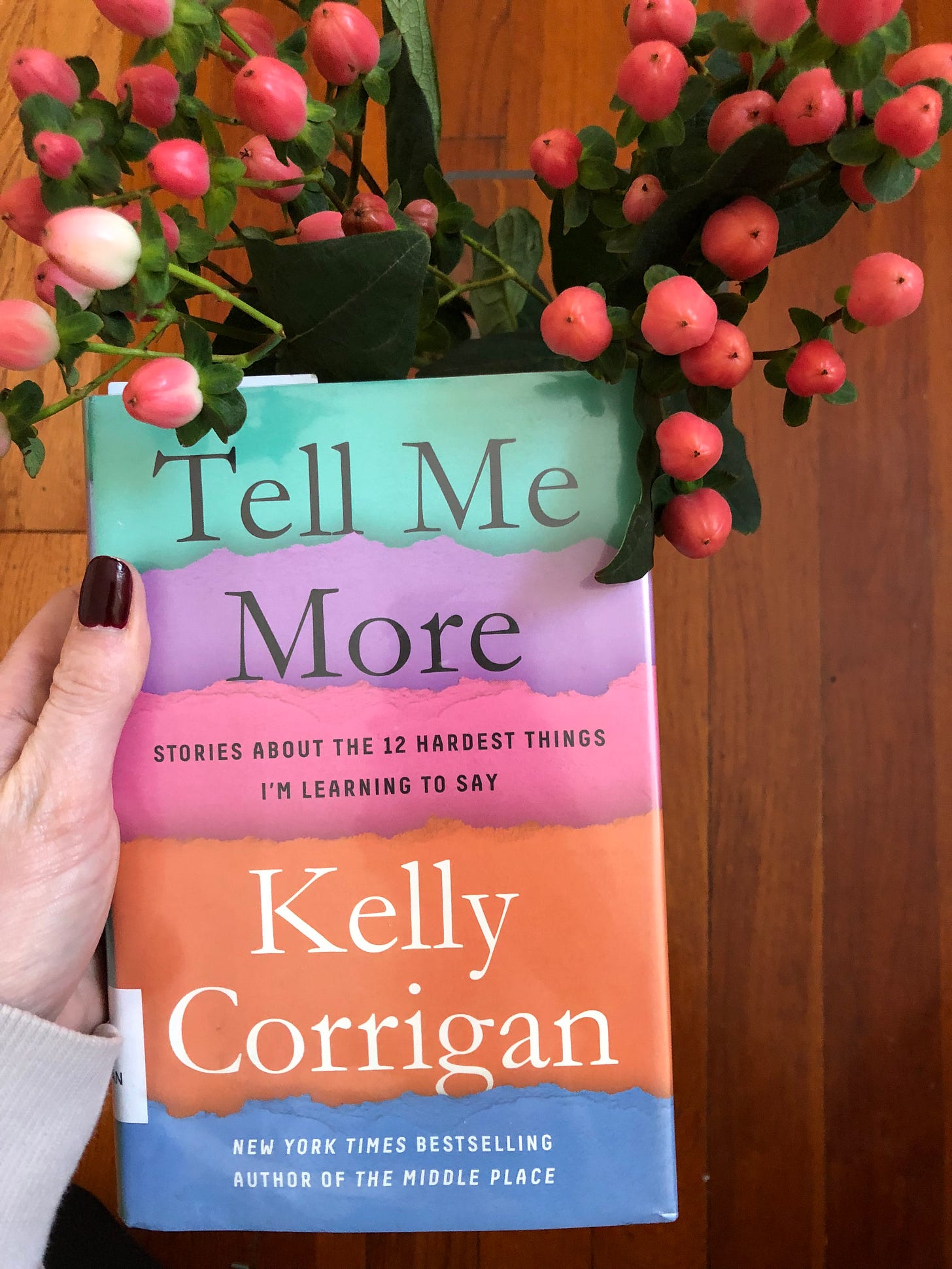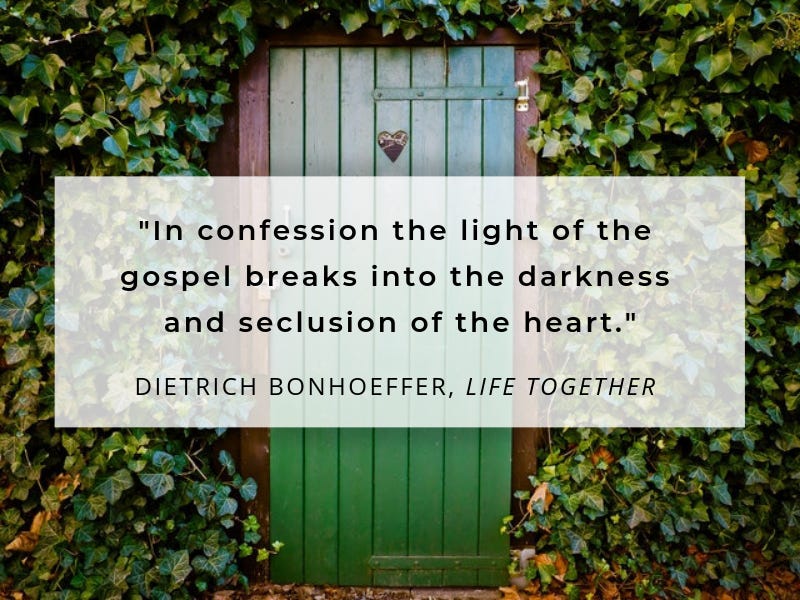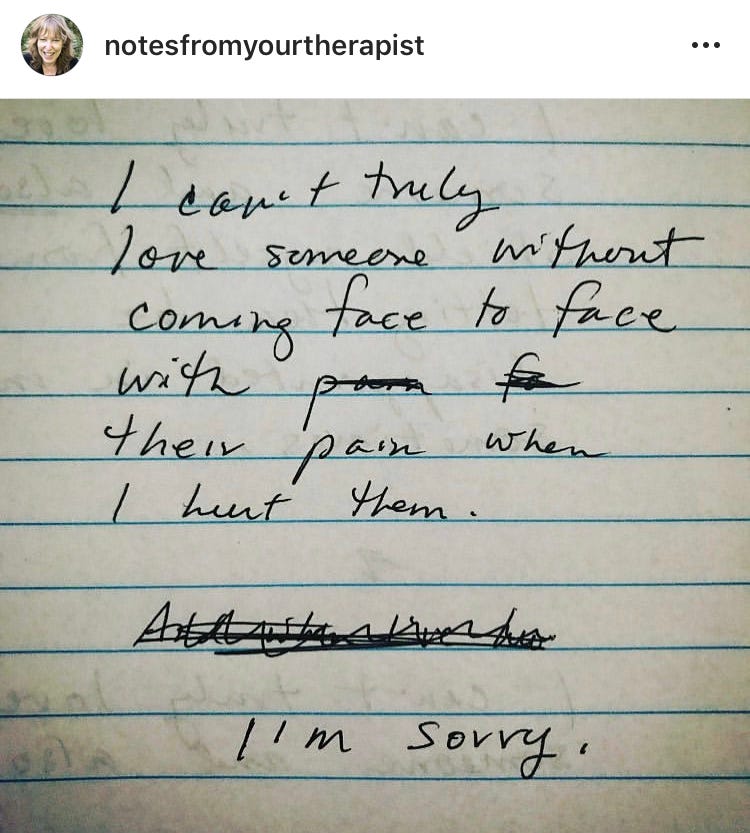In a Word - Sorry

Welcome to In a Word, a newsletter which cultivates thoughtfulness, one word at a time.


In this issue, we’re exploring the word “sorry.” To be human is to know regret and remorse—feeling sorry. But saying sorry (honestly and without excuse) is rare and ever rarer. Fake apologies abound in the Age of Outrage. A sincere sorry bows low and digs deep, punctures the ego, invites mercy, extinguishes pride.
This issue aims to look at “sorry” from all of those angles, hopefully in a way that helps us say sorry quicker when we need to, and dispense with the unwarranted “sorry” reflex for good. I mean, this is just a newsletter, BUT MY DREAMS FOR US ARE BIG. Thanks for reading. It means the world to me.
Below you’ll find a personal essay, a collection of articles about why women apologize, how to make better apologies, and the state of the public apology. Plus: a giveaway (!), a podcast featuring overdue apologies, an essay collection, three quotes, a few last links worth bookmarking, and a closing benediction.

What a Starbucks policy and a snippy phone call reveal about human nature.
It’s 8:32am, peak rush hour at this suburban Starbucks, when a pristine woman orders a fussy version of an iced latte. In minutes, the sweating plastic cup lands on the end of the bar with four ice cubes instead of the three she requested.
In the Starbucks ecosystem, employees must “make it right,” no matter how unreasonable or high maintenance the customer. Not many, but some will take this policy as a license to behave badly. Our impeccably dressed subject is one such customer. The frustrations she is powerless against at work, with her kids, in her marriage explode into vitriol. She overreacts here, in the melting face of miscounted ice cubes, because she can.
“I’m sorry, ma’am. We’ll fix it right away,” is the only response the barista can mutter. It’s an apology born in a boardroom, typed into an employee manual, and extracted like a blackhead.
When my friend, a former Starbucks barista, tells me about the fussy ice cube lady, I feel outrage building into an intoxicating high of moral superiority. I want to villainize her, but then I remember that I am her.

Allow me to illustrate.
It’s a muggy fall morning that still feels like summer. I tap my doctor’s name into my phone’s contact list, finally making a call I’d been putting off for months. I need her office to send my records to another doctor’s office, and I need them to do it before 3PM today.
I’m met with a no-nonsense hello, and breathe in to channel my husband’s concise, confident phone charisma before making my request. (He never apologizes for asking, which feels like a superpower to a woman with the social conditioning of a doormat.)
I pull off the right tone, I’m sure of it, but bureaucracy hits me on the mouth nonetheless. I must fill out a form to “release” my records, like they’re newly hatched (possibly endangered) sea turtles. She addresses me with the universal signal of professional passive aggression— “Ma’am” —before explaining HIPPA. If I worried about privacy I would have deleted Facebook by now, MA’AM.
She invites me to download, print, fill out, and fax the form. The obvious next question is, “Can I email it?” but I know the answer before I ask.
“Fax it?” I’m aware of efax.com, but play dumb, hoping she’ll give me the secret email address for patients who are not lawyers and therefore don’t have access to fax machines. In the beat of charged silence that comes next, she says I’m welcome to mail it or bring it by the office. Sure, I’ll send my friendly Pony Expressman clip-clopping over this afternoon.
Why is this woman responding to my extremely unique circumstances with boilerplate answers? Why isn’t she making my problem her problem? Where’s a Starbucks customer service policy when you need one?
My initial cool charisma has long evaporated when she hits me with the kicker: there’s a two week turn-around time. Even if I Paul Revere my way to the office right now, it’s too late. I don’t remember the specific words I used to end the conversation, but something like: “You’ve been no help at all.” I didn’t yell—I’m not a yeller—but I sighed and snipped and generally oozed unpleasantness.
I wanted her to empathize. I wanted my way, policies be damned. I wanted her to match my level of urgency. She didn’t, and I felt wronged, just as my toddler feels when I don’t let her jam her sticky fingers into my hot mug of coffee.
Luckily this is where my path diverges from my toddler’s, and I realize that my anger is misplaced. The two week policy seems dumb, but upon further reflection, so does my expectation that a practice of ten doctors will drop everything to fax dozens of pages. (I’m trying to take responsibility here, but I do blame Amazon for our collective unreasonable expectations when it comes to turn-around times.)
Two minutes later, I call back before I can let myself off the hook. My ears aren’t on fire anymore. I’m sitting calmly at my desk instead of pacing like a stockbroker watching the Dow plummet. The same woman answers, with the same detached, preemptively defensive tone.
“Hi, this is Jacey Verdicchio—I called a few minutes ago about my records?”
“Yes,” she say, her voice prickly.
“I’m just calling back to say I’m sorry for taking my frustration out on you. Really I was frustrated with myself, for not taking care of this sooner. I—”
She interrupts me with a series of stuttered half words, toughness melting into jelly. She doesn’t promise to expedite my request, but she calls me “hon” in the tone I imagine she uses with her grandchildren.
“Thanks for being patient with me, and for your help,” I say, the weight of regret lifting from my shoulders.
She still hasn’t found her balance and struggles to put the words in the right order when she says: “Alright hon, you have a good one, nice weekend, now.”

I worked as a receptionist for two years after college, in the height of the recession. Our company handled real estate closings, most of which were short sales and foreclosures, which is to say, it was a tense time.
I can still feel the anxiety crackling through the phone cord on calls with brokers and realtors desperate to salvage what they could from a crumbling market. I did not cause and could not solve their problems, but I had answers they didn’t want, so they yelled. Powerless to stop their careers plummeting with the market, they made me the locus of their frustration.
The Starbucks customer, the realtors and I shared the dark instinct to dominate instead of relate, to overpower instead of understand. I’m no sociologist, but how many of our most pressing cultural problems find their rotting roots in this ugly impulse? Two risky words will cost us our egos, but restore our souls: I’m sorry.

Before diving into our collection, I’m excited to announce In a Word’s first ever giveaway! I plan to host these whenever I find a fun item related to the issue’s theme.
Next Wednesday marks the beginning of Lent, the season leading up to Easter and marked for repentance in the church calendar. Erin Moon has created a brilliant tool to lead us through Lent. (I know it’s brilliant because I already have my copy).

This guide has 47 daily devotions in PDF in audio form designed to walk you through Christ's journey towards resurrection. Plus, there’s a playlist and daily piece of art to go with each entry. (If you don’t know anything about Lent or the church calendar, this guide also has the perfect primer for you.)
ORDER YOUR COPY HERE, AND USE CODE INAWORD15 FOR A 15% DISCOUNT.
To enter to win a copy: share In a Word on Instagram, Facebook or Twitter and tag me (@jaceyverdicchio).
I’ll select a random winner the day before Lent begins, a week from today (3/5/19).

A sorry collection, including articles about why women apologize, how to make better apologies, and the state of the public apology. Plus: a podcast featuring overdue apologies, an essay collection, and three quotes.
Why Women Apologize and Should Stop. (It’s not why you might think.)
On the heels of Roseanne Barr’s racist tweet (a lifetime ago in Twitter years), Margaret Renkl wrote some really useful and insightful stuff about how to apologize (better).
Apologies to None and All “In America, the public apology is vacuous. It is theater. A performance with a predetermined outcome.”
I held my breath through most of this podcast episode, featuring listeners’ apology voicemails which were so deeply personal, I felt like I was eavesdropping. It left me ruminating on the absence of a mechanism for confession, apology, and release from shame in most arenas of modern life.

Kelly Corrigan manages to teach us how to apologize in this domestic drama centered around poop. I salute her. (The poop essay is excerpted from her new essay collection, Tell Me More. I flew through it, despite trying to savor, laughing and crying all the way.)

This quote (and the following section) from Bonhoeffer’s book on Christian community got me thinking about loneliness amongst friends. To feel unknown (and therefore unloved) because of hidden darkness is perhaps the loneliest feeling of all.

“I can’t truly love someone without coming face to face with their pain when I hurt them. I’m sorry.”
The Notes from Your Therapist Instagram account casually dropped this in my lap last week.

My favorite line from Baby Mama, A TRAGICALLY UNDERRATED FILM, if you want my opinion. If surreptitiously breaking wind into someone’s purse isn’t the best revenge, I don’t know what is.

A few last links worth bookmarking:
11 Hilarious Apology Notes From Kids (please be warned that many of these involve privates injuries.)
Fun apology cards: Whoops, ⌘Z, forgetful dog.

May we tear down walls of pride and ego, making way for genuine apology. May we bow low and dig deep to say sorry like we mean it. At the same time, may we break free from the clutches of approval addiction, insecurity, and self sabotage that push us to apologize when we’ve done nothing wrong. May we come out from the hiding place built from a thousand sorries and let ourselves be seen.
As always, I’d also love to hear your thoughts on anything this issue calls to mind for you. Simply reply to this email to let me know.
Gratefully, Jacey
Connect with me elsewhere: Instagram | Twitter

If you like In a Word, please share it! A few ways:
Click the arrow key at the bottom of this email to share on Facebook or Twitter
Forward this email to a friend
Screenshot your favorite part and share on Instagram (use hashtag #inawordnewsletter, and tag me @jaceyverdicchio)
Share this link in a text message



